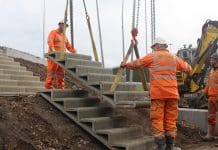A recent report by PwC predicts that by 2030, there will be 76,000 drones in operation in UK skies, saving the construction industry £3.5 billion
The report also suggests that drone technology will see a 3.1% increase in productivity for the sector.
The authors, Elaine Whyte, Jenny Frances, Dr Jonathan Gillam and Joanne Murray quoted the following benefits of drones compared to traditional methods:
- Increased efficiency – a site survey can be 400 times quicker
- Lower costs
- Survey Grade Accuracy – comparable to traditional, labour intensive land surveying, accuracy is typically is 3cm horizontally and vertically, with a pixel in an orthomosaic map representing 3cm in real life
- enhanced data set – improved photographic visualisaton in 2D and 3D
The construction industry currently uses drone technology to provide cheap and effective ways to map sites and track progress.
Drones provide aerial footage used to collect three dimensional information that is integrated with Building Information Modelling (BIM) systems, to create accurate representations of projects used to gauge measurements among other valuable uses.
The report suggests that by embedding periodic drone flights throughout the construction life cycle could provide a ‘golden record’ of all construction related activities. This means that managers and project leaders can keep track of all operations until the project is completed.
Data collected by drone technology can be accessed via the cloud that would be available to many stakeholders across multiple locations working on a project. This would eliminate arguments over project status and could be used as evidence in case of litigation.
As stated in the report, drones not only provide benefits for the construction industry. It has been shown that drones aid many other industries and sectors including fire safety, the media and manufacturing.
The report goes on to predict that 628,000 people will be working in the drone economy by 2030. The widespread use of drones throughout multiple industries is expected to create more jobs that require creative individuals who will be able to use drones to build, maintain, operate and regulate related technologies that are on the rise.

















